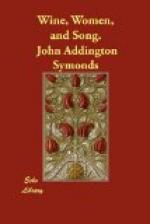“Perstrepuit modulis
Gallia tota meis.”
(All France rang with my songs.)
We might compare the versus of the Middle Ages with the stiff sculptures on a Romanesque font, lifelessly reminiscent of decadent classical art; while the moduli, in their freshness, elasticity, and vigour of invention, resemble the floral scrolls, foliated cusps, and grotesque basreliefs of Gothic or Lombard architecture.
V.
Even in the half-light of what used to be called emphatically the Dark Ages, there pierce gleams which may be reflections from the past evening of paganism, or may intimate the earliest dawn of modern times. One of these is a song, partly popular, partly scholastic, addressed to a beautiful boy.[1] It begins thus—
“O admirabile veneris idolum”—
and continues in this strain, upon the same rhythm, blending reminiscences of classical mythology and medieval metaphysic, and winding up with a reference to the Horatian Vitas hinnuleo me similis Chloe. This poem was composed in the seventh century, probably at Verona, for mention is made in it of the river Adige. The metre can perhaps be regarded as a barbarous treatment of the long Asclepiad; but each line seems to work out into two bars, divided by a marked rest, with two accents to each bar, and shows by what sort of transition the modern French Alexandrine may have been developed.
The oddly archaic phraseology of this love-song rendered it unfit for translation; but I have tried my hand at a kind of hymn in praise of Rome, which is written in the same peculiar rhythm:[2]—
“O Rome illustrious,
of the world emperess!
Over all cities thou queen
in thy goodliness!
Red with the roseate blood
of the martyrs, and
White with the lilies of virgins
at God’s right hand!
Welcome we sing to thee; ever
we bring to thee
Blessings, and pay to thee
praise for eternity.
“Peter, thou praepotent
warder of Paradise,
Hear thou with mildness the
prayer of thy votaries;
When thou art seated to judge
the twelve tribes, O then
Show thyself merciful; be
thou benign to men;
And when we call to thee now
in the world’s distress,
Take thou our suffrages, master,
with gentleness.
“Paul, to our litanies
lend an indulgent ear,
Who the philosophers vanquished
with zeal severe:
Thou that art steward now
in the Lord’s heavenly house,
Give us to taste of the meat
of grace bounteous;
So that the wisdom which filled
thee and nourished thee
May be our sustenance through
the truths taught by thee.”
A curious secular piece of the tenth century deserves more than passing mention. It shows how wine, women, and song, even in an age which is supposed to have trembled for the coming destruction of the world, still formed the attraction of some natures. What is more, there is a certain modern, as distinguished from classical, tone of tenderness in the sentiment. It is the invitation of a young man to his mistress, bidding her to a little supper in his rooms:[3]—




